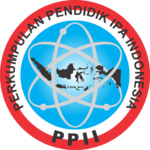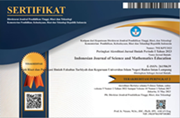A Meta-Analysis on The Effect of Inquiry Learning Model on Students’ Mathematical Problem-Solving Skills
Abstract
Keywords
Full Text:
PDFReferences
Kemendikbud, Modul Manajemen Implementasi Kurikulum 2013. Jakarta: Kemendikbud, 2018.
D. Beigie, “Integrating Content to Create Problem-Solving Opportunities,” Math. Teach. Middle Sch., vol. 13, no. 6, 2008.
J. Anderson, “Mathematics Curriculum Development and the Role of Problem Solving,” 2009.
J. Kilpatrick, J. Swafford, and B. Findell, Adding It Up: Helping Children Learn Mathematics. United States of America: National Academy Press, 2001.
NCTM, Principles and Standards for School Mathematics. United States of America: Library of Congress, 2000.
Asnidar, S. Khabibah, and R. Sulaiman, “The Effectiveness of Guided Inquiry Learning for Comparison Topics,” J. Phys. Conf. Ser., vol. 947, no. 1, 2017, doi: 10.1088/1742-6596/947/1/012033.
W. Sanjaya, Strategi Pembelajaran. Jakarta: Kencana Prenada Media Group, 2014.
D. Kurniawati, S. Sutiarso, and Widyastuti, “Efektivitas Model Pembelajaran Inkuiri Berbasis Ethnomathematics Terhadap Kemampuan Pemecahan Masalah Matematis Siswa,” J. Pendidik. Mat. Unila, vol. 6, pp. 293–304, 2018.
N. Solikhah, E. R. Winarti, and A. W. Kurniasih, “Keefektifan Model Guided Inquiry dengan Pendekatan Keterampilan Metakognitif terhadap Kemampuan Pemecahan Masalah,” J. Kreano, vol. 5, no. 1, pp. 18–25, 2014, doi: 10.15294/kreano.v5i1.3273.
Y. Meidawati, “Pengaruh Pendekatan Pembelajaran Inkuiri Tebimbing Terhadap Peningkatan Kemampuan Pemecahan Masalah Matematis Siswa SMP,” J. Pendidik. dan Kegur., vol. 1, no. 2, 2014.
G. Nadhifah and E. A. Afriansyah, “Peningkatan Kemampuan Pemecahan Masalah Matematis Siswa dengan Menerapkan Model Pembelajaran Problem Based Learning dan Inquiry,” J. Musharafa, vol. 5, no. 1, pp. 33–44, 2016.
V. N. Yulian, “Meningkatkan Kemampuan Pemecahan Masalah Matematis Siswa Melalui Metode Pembelajaran Metode Inkuiri Berbantuan Software Algebrator,” Jppm, vol. 9, no. 1, pp. 20–24, 2016.
M. Zulfikar, T. Tayeb, and Mardhiah, “Perbandingan Penerapan Metode Inquiry Terbimbing Dan Metode Inquiry Bebas Termodifikasi Terhadap Kemampuan Pemecahan Masalah Matematika Siswa,” Alauddin J. Math. Educ., vol. 1, no. 1, 2017.
M. D. Bidari, R. Asnawati, and Widyastuti, “Efektivitas Model Pembelajaran Guided Inquiry Ditinjau dari Kemampuan Pemecahan Masalah Matematis Siswa,” J. Pendidik. Mat. Unila, vol. 5, no. 8, pp. 914–925, 2017.
A. Pinasti, R. Asnawati, and A. P. Wijaya, “Efektivitas Model Pembelajaran Inkuiri Terbimbing untuk Meningkatkan Kemampuan Pemecahan Masalah Matematis Siswa,” J. Pendidik. Mat. Unila, vol. 7, no. 3, pp. 310–321, 2019.
L. V. Hedges and I. Olkin, Statistical Methods for Meta-Analysis. Florida: Academic Press, 1985.
T. J. Cleophas and A. H. Zwinderman, Modern Meta-Analysis. Switzerland: Springer, 2017.
G. Schwarzer, J. R. Carpenter, and G. Rücker, Meta-Analysis with R. Switzerland: Springer, 2015.
L. B. Shelby and J. Vaske, “Understanding meta-analysis: A review of the methodological literature,” Leis. Sci., vol. 30, no. 2, pp. 96–110, 2008, doi: 10.1080/01490400701881366.
K. Kadir, “Meta-Analysis of the Effect of Learning Intervention Toward Mathematical Thinking on Research and Publication of Student,” TARBIYA J. Educ. Muslim Soc., vol. 4, no. 2, pp. 162–175, 2017, doi: 10.15408/tjems.v4i2.8010.
D. Juandi et al., “The Effectiveness of Dynamic Geometry Software Applications in Learning Mathematics: A Meta-Analysis Study,” Int. J. Interact. Mob. Technol., vol. 15, no. 2, pp. 18–37, 2021, doi: 10.3991/ijim.v15i02.18853.
M. Tamur, D. Juandi, and A. M. G. Adem, “Realistic Mathematics Education in Indonesia and Recommendations for Future Implementation: A Meta-Analysis Study,” JTAM | J. Teor. dan Apl. Mat., vol. 4, no. 1, p. 17, 2020, doi: 10.31764/jtam.v4i1.1786.
M. Tamur and D. Juandi, “Effectiveness of constructivism based learning models against students mathematical creative thinking abilities in indonesia; a meta-analysis study,” 2020, doi: 10.4108/eai.12-10-2019.2296507.
M. L. McHugh, “Lessons in biostatistics interrater reliability : the kappa statistic,” Biochemica Medica, vol. 22, no. 3. pp. 276–282, 2012, [Online]. Available: https://hrcak.srce.hr/89395.
A. J. Viera and J. M. Garrett, “Understanding Interobserver Agreement: The Kappa Statistic,” Fam. Med., vol. 37, no. 5, 2005.
D. Juandi and M. Tamur, Pengantar Analisis Meta. Bandung: UPI Press, 2020.
M. Borestein, L. V. Hedges, J. P. T. Higgins, and H. R. Rothstein, Introduction to meta-analysis. United Kingdom: John Wiley & Sons, 2009.
M. W. Lipsey and D. B. Wilson, Practical Meta Analysis. United Stated of America: SAGE Publications, 2001.
B. Mullen, P. Muellerleile, and B. Bryant, “Cumulative meta-analysis: A consideration of indicators of sufficiency and stability,” Personal. Soc. Psychol. Bull., vol. 27, no. 11, pp. 1450–1462, 2001, doi: 10.1177/01461672012711006.
N. Susanti, D. Juandi, and M. Tamur, “The Effect of Problem-Based Learning (PBL) Model On Mathematical Communication Skills of Junior High School Students – A Meta-Analysis Study,” JTAM (Jurnal Teor. dan Apl. Mat., vol. 4, no. 2, p. 145, 2020, doi: 10.31764/jtam.v4i2.2481.
F. Dochy, M. Segers, P. Van den Bossche, and D. Gijbels, “Effects of problem-based learning: A meta-analysis from the angle of assessment,” Learn. Instr., vol. 75, no. 1, 2002, doi: 10.3102/00346543075001027.
Ö. G. Bayir and M. Bozkurt, “Effectiveness of Cooperative Learning Approaches Used in the Course of Social Studies in Turkey: a Meta-Analysis Study,” Eur. J. Educ. Stud., vol. 4, no. 10, pp. 171–192, 2018.
M. F. B. Paloloang, D. Juandi, M. Tamur, B. Paloloang, and A. M. G. Adem, “Meta Analisis : Pengaruh Problem-Based Learning Terhadap Kemampuan Literasi Matematis Siswa Di Indonesia Tujuh Tahun Terakhir,” AKSIOMA J. Progr. Stud. Pendidik. Mat., vol. 9, no. 4, pp. 851–864, 2020.
M. Tamur, E. Jehadus, F. Nendi, K. Mandur, and V. Murni, “Assessing the effectiveness of the contextual teaching and learning model on students’ mathematical understanding ability: A meta-analysis study,” J. Phys. Conf. Ser., vol. 1657, no. 1, 2020, doi: 10.1088/1742-6596/1657/1/012067.
Suparman, D. Juandi, and M. Tamur, “Review of problem-based learning trends in 2010-2020: A meta-analysis study of the effect of problem-based learning in enhancing mathematical problem-solving skills of Indonesian students,” J. Phys. Conf. Ser., vol. 1722, no. 1, pp. 0–9, 2021, doi: 10.1088/1742-6596/1722/1/012103.
Y. Yunita, D. Juandi, M. Tamur, A. M. G. Adem, and J. Pereira, “A meta-analysis of the effects of problem-based learning on students’ creative thinking in mathematics,” Beta J. Tadris Mat., vol. 13, no. 2, pp. 104–116, 2020, doi: 10.20414/betajtm.v13i2.380.
Y. K. Sari, D. Juandi, M. Tamur, and A. M. G. Adem, “Meta-Analysis: Mengevaluasi Efektivitas Problem-Based Learning Pada Kemampuan Pemahaman Matematis Siswa,” J. Honai Math, vol. 4, no. 1, pp. 1–18, 2021.
DOI: http://dx.doi.org/10.24042/ijsme.v4i3.9730
Refbacks
- There are currently no refbacks.
Copyright (c) 2021 Unit Riset dan Publikasi Ilmiah FTK UIN Raden Intan Lampung

This work is licensed under a Creative Commons Attribution-ShareAlike 4.0 International License.

Indonesian Journal of Science and Mathematics Education is licensed under a Creative Commons Attribution-ShareAlike 4.0 International License.





